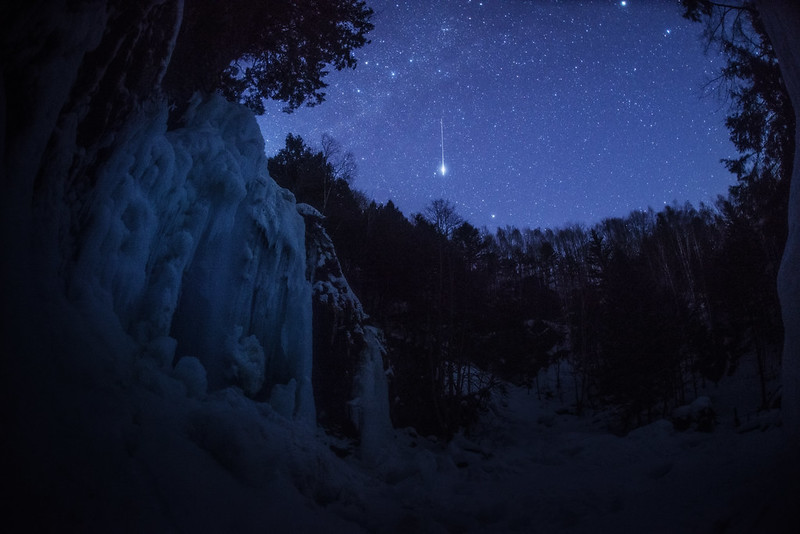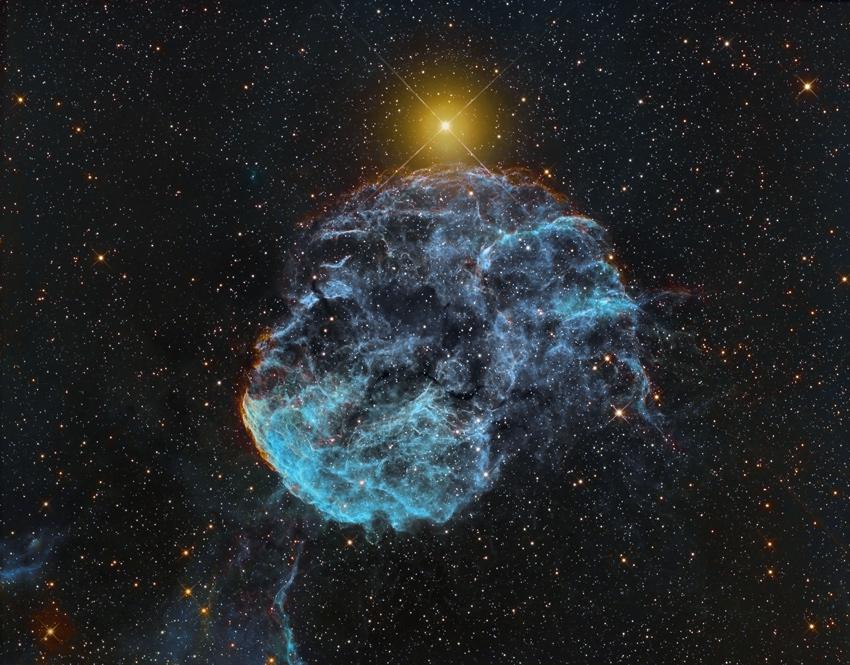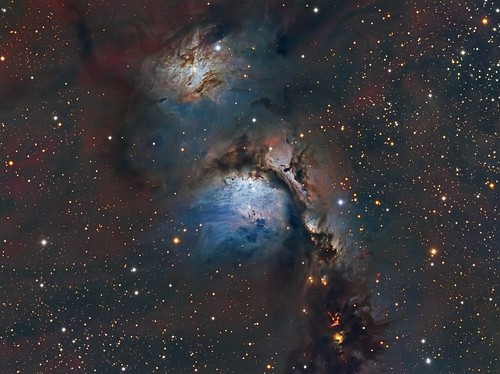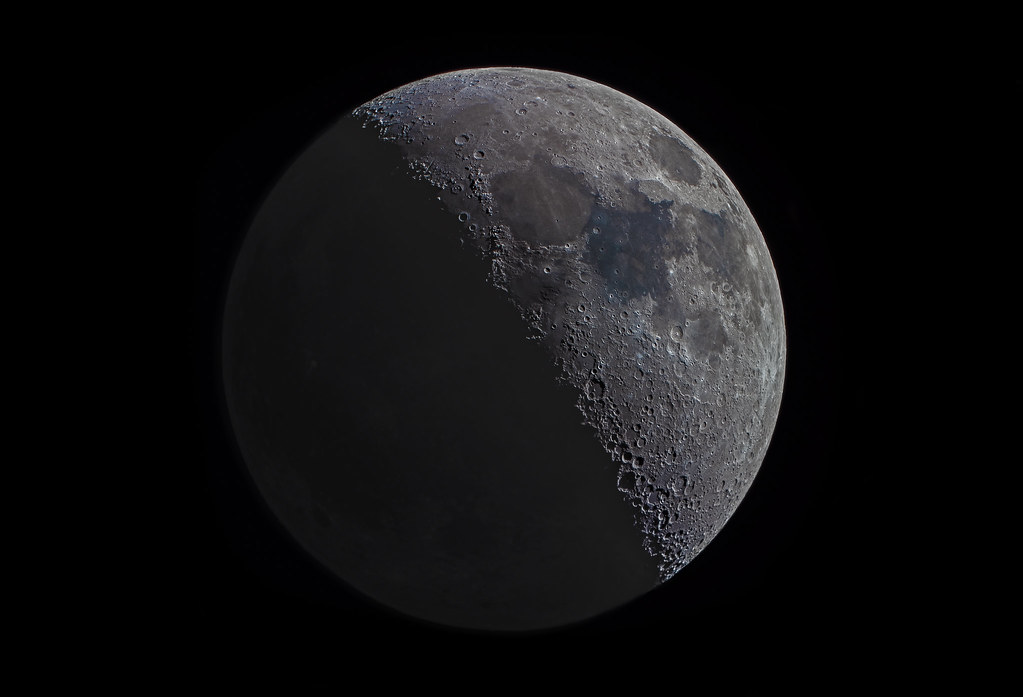Submissions: 2018 January
Re: Submissions: 2018 January
Rosette nebula in narroband
Copyright: Juan Ignacio Jimenez
Copyright: Juan Ignacio Jimenez
Re: Submissions: 2018 January
crescent moon in the city
temple of diana http://www.spanisharts.com/arquitectura ... diana.html with aquarium stars in a river park in water
temple of diana http://www.spanisharts.com/arquitectura ... diana.html with aquarium stars in a river park in water
Re: Submissions: 2018 January
The Orion Nebula M-42 (Mapped Color)
Photo details:
TEC140 f/5,2 montaż AP MyT, ATIK One 6.0 filter set: Ha, SII, OIII Baader Planetarium
Total time: 14,5h Ha: 40x15s, 26x300s, 18x900s, SII: 22 x10s binx2, 62 x300s binx2, OIII: 21x15s binx2, 32 x 300s binx2
01.2018 Ochojno, Poland
Full size:
http://www.astrobogdan.pl/wp/wp-content ... e_jpeg.jpg
Bogdan Jarzyna
http://www.astrobogdan.pl
Photo details:
TEC140 f/5,2 montaż AP MyT, ATIK One 6.0 filter set: Ha, SII, OIII Baader Planetarium
Total time: 14,5h Ha: 40x15s, 26x300s, 18x900s, SII: 22 x10s binx2, 62 x300s binx2, OIII: 21x15s binx2, 32 x 300s binx2
01.2018 Ochojno, Poland
Full size:
http://www.astrobogdan.pl/wp/wp-content ... e_jpeg.jpg
Bogdan Jarzyna
http://www.astrobogdan.pl
-
masahiro miyasaka
- Ensign
- Posts: 39
- Joined: Fri Dec 31, 2010 12:37 pm
- Contact:
IC443 HO
Hello,
5 Hours of Ha bin1, 1 hour of OIII bin2
ASA10, Moravian 16200, AZEQ6
Full is here https://cdn.astrobin.com/thumbs/xoELacP ... hqkGbg.jpg
5 Hours of Ha bin1, 1 hour of OIII bin2
ASA10, Moravian 16200, AZEQ6
Full is here https://cdn.astrobin.com/thumbs/xoELacP ... hqkGbg.jpg
-
SpookyAstro
- Science Officer
- Posts: 117
- Joined: Sat Feb 07, 2015 7:38 pm
Re: Submissions: 2018 January
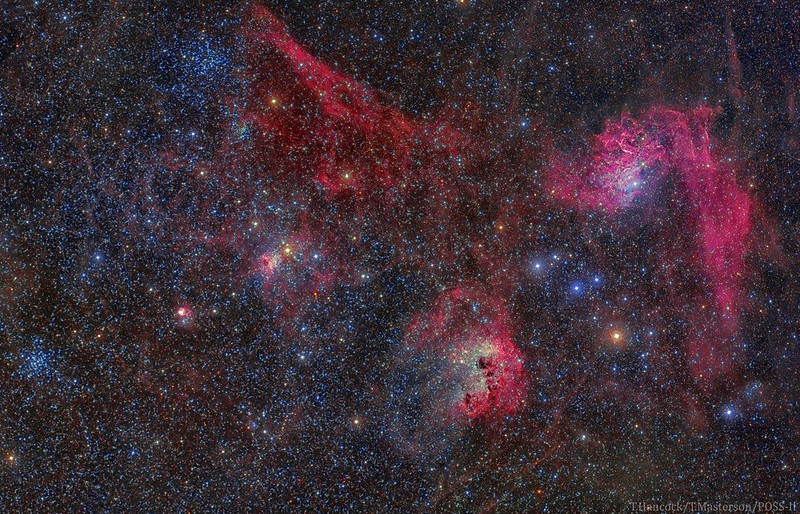 Gems of Auriga-POSS-II (reprocessed) by Transient Astronomer, on Flickr
Gems of Auriga-POSS-II (reprocessed) by Transient Astronomer, on FlickrImage Credit and Copyright POSS-II, Tom Masterson, Terry Hancock
-
Eric Ganz
NGC 1333 Star Forming Region - Deep exposure With Herbig-Haro objects
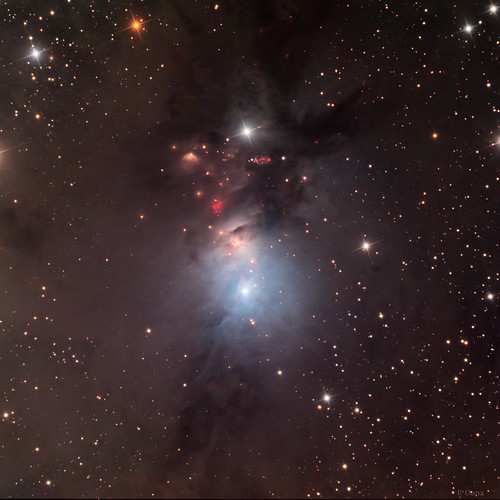 NGC 1333 Star Forming Region - Deep exposure by Eric Ganz, on Flickr
NGC 1333 Star Forming Region - Deep exposure by Eric Ganz, on FlickrWith a strong reflection nebula (blue) in the center, and weaker reddish brown and mixed tan emission nebula at the edges, this star forming region contains lots of dust and numerous new stars. Remarkable complexity is observed.
36 Herbig-Haro objects are also located here. These display unusual and interesting shapes, with characteristic red features. Zoom in to see these features in detail.
The central stars are dramatically lighting up the nebula.
Imaged from Deep Sky West - Rowe New Mexico, using RCOS 14.5” Ritchey–Chrétien telescope f/9. 3340 mm focal length.
L 16 hours exposure.
RGB 5:7:6 hours. 34 hours total exposure
-
paddygilliland
- Ensign
- Posts: 23
- Joined: Fri Oct 20, 2017 8:58 am
-
cosmicwreckingball
- Ensign
- Posts: 31
- Joined: Tue May 26, 2015 2:57 pm
- AKA: Matt Harbison
- Location: Chattanooga, TN
- Contact:
Re: Submissions: 2018 January
The Milky Way, Winter Circle, and Summer Triangle
Images of the Milky Way taken from Marathon Texas in July & January to highlight the two visible halves of our Galaxy from the Northern Hemisphere. Composite image created from DSLR data collected in 2017 and 2018.
24 Images taken with a Canon 5Dmk3 & a SkyWatcher Star Adventurer. Assembled in Photoshop. Please view full screen: https://www.astrobin.com/full/329849/B/

Images of the Milky Way taken from Marathon Texas in July & January to highlight the two visible halves of our Galaxy from the Northern Hemisphere. Composite image created from DSLR data collected in 2017 and 2018.
24 Images taken with a Canon 5Dmk3 & a SkyWatcher Star Adventurer. Assembled in Photoshop. Please view full screen: https://www.astrobin.com/full/329849/B/

-
PatrickWinkler
- Ensign
- Posts: 82
- Joined: Wed May 25, 2016 4:24 pm
- Location: Traiskirchen (Austria)
- Contact:
Re: Submissions: 2018 January
Moon, Saturn, Mercury
Copyright: Steve Johnston Waxing crescent moon, Saturn (upper right) and Mercury (left).
Taken from Carnegie, Melbourne, Australia, 10.20 UT on 20 November 2017.
Copyright: Steve Johnston Waxing crescent moon, Saturn (upper right) and Mercury (left).
Taken from Carnegie, Melbourne, Australia, 10.20 UT on 20 November 2017.
Re: Submissions: 2018 January
Sun pillar sunrise
Copyright: Steve Johnston Taken with iPad, Scarborough, Queensland on 1 March 2017.
Copyright: Steve Johnston Taken with iPad, Scarborough, Queensland on 1 March 2017.
Re: Submissions: 2018 January
SH2-63 in Sagittarius
Copyright Leonardo Julio
http://astronomiapampeana.com.ar/foto/1 ... ation.html
Copyright Leonardo Julio
http://astronomiapampeana.com.ar/foto/1 ... ation.html
- felopaul
- Ensign
- Posts: 97
- Joined: Mon Apr 29, 2013 7:14 pm
- AKA: Felopaul
- Location: Flagey (France)
- Contact:
Re: Submissions: 2018 January
IC 1848 SHO, 111 hrs
full size & info : http://www.cielboreal.com/galerie/photo76.htm
total frame 111Hr done with AP155 on Paramount MX+ with Moravan G4 in La Ginerie , France
IC 1848 SHO, 47 hrs (new processing version)
full size & info : http://www.cielboreal.com/galerie/photo75.htm
total frame 47Hr done with CDK20 on Paramount ME2 with Moravan G4 in Flagey , France
http://www.cielboreal.com
Copyright: Team CielBoreal with J.C CANONNE, P. BERNHARD, D. CHAPLAIN & L. BOURGON
full size & info : http://www.cielboreal.com/galerie/photo76.htm
total frame 111Hr done with AP155 on Paramount MX+ with Moravan G4 in La Ginerie , France
IC 1848 SHO, 47 hrs (new processing version)
full size & info : http://www.cielboreal.com/galerie/photo75.htm
total frame 47Hr done with CDK20 on Paramount ME2 with Moravan G4 in Flagey , France
http://www.cielboreal.com
Copyright: Team CielBoreal with J.C CANONNE, P. BERNHARD, D. CHAPLAIN & L. BOURGON
Last edited by felopaul on Fri Jan 26, 2018 11:49 am, edited 2 times in total.
Re: Submissions: 2018 January
The Seagull Nebula
http://www.astrosurf.com/ilizaso
Copyright: Inaki Lizaso
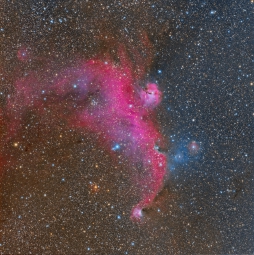
http://astrosurf.com/ilizaso/orriak/3ma ... Q_U16m.htm
http://www.astrosurf.com/ilizaso
Copyright: Inaki Lizaso

http://astrosurf.com/ilizaso/orriak/3ma ... Q_U16m.htm
Re: Submissions: 2018 January
NGC 2174 Monkey head nebula narrowband bi-color
Copylight ByoungJun Jeong
full resolution
https://www.astrobin.com/full/330930/0/?nc=user
Copylight ByoungJun Jeong
full resolution
https://www.astrobin.com/full/330930/0/?nc=user
-
Brendan Keene
- Asternaut
- Posts: 8
- Joined: Sun Oct 08, 2017 12:42 pm
Re: Submissions: 2018 January
First Quarter Moon with Earthshine (Colour)
Full Resolution and Info: https://www.flickr.com/photos/151036289 ... ateposted/
Full Resolution and Info: https://www.flickr.com/photos/151036289 ... ateposted/
-
barretosmed
- Science Officer
- Posts: 482
- Joined: Thu Oct 12, 2017 6:04 pm
Re: Submissions: 2018 January
SPICULES SOLAR
https://www.astrobin.com/full/330920/0/?nc=iotd
EQUIPAMENTS:
APO 80mm TS 6 elements
Daystar cromosphere
ASi 174mm
Filter IR CUT daystar
Date: 01/19/2018
Chapada dos Guimarães - MT - Brazil
Copyright: Fernando Oliveira de Menezes
https://www.astrobin.com/full/330920/0/?nc=iotd
EQUIPAMENTS:
APO 80mm TS 6 elements
Daystar cromosphere
ASi 174mm
Filter IR CUT daystar
Date: 01/19/2018
Chapada dos Guimarães - MT - Brazil
Copyright: Fernando Oliveira de Menezes
-
barretosmed
- Science Officer
- Posts: 482
- Joined: Thu Oct 12, 2017 6:04 pm
Re: Submissions: 2018 January
SUN IN H-ALPHA
Through this image we can estimate the approximate measure of solar prominences and spiculaes. Note the greater prominence measured approximately 70,000 km.
The Earth has on average an average diameter of 12,756 km, so this prominence has a measurement larger than 5x the size of the earth.
I will show in other images the greater focus on the prominences and spicules visible on this globe, in later images.
Focus held during the event TELESCOPIO NA CHAPADA
ASTROBIN? https://www.astrobin.com/full/330881/0/ ... real=&mod=
EQUIPMENTS:
APO 80mm TS 6 elements
Focal reducer 0.5x GSO
Daystar cromosphere
Yes 174mm
Filter IR CUT daystar
Date: 01/19/2018
Chapada dos Guimaraes
Copyright: Fernando Oliveira de Menezes
Through this image we can estimate the approximate measure of solar prominences and spiculaes. Note the greater prominence measured approximately 70,000 km.
The Earth has on average an average diameter of 12,756 km, so this prominence has a measurement larger than 5x the size of the earth.
I will show in other images the greater focus on the prominences and spicules visible on this globe, in later images.
Focus held during the event TELESCOPIO NA CHAPADA
ASTROBIN? https://www.astrobin.com/full/330881/0/ ... real=&mod=
EQUIPMENTS:
APO 80mm TS 6 elements
Focal reducer 0.5x GSO
Daystar cromosphere
Yes 174mm
Filter IR CUT daystar
Date: 01/19/2018
Chapada dos Guimaraes
Copyright: Fernando Oliveira de Menezes
-
Manel Martín Folch
- Ensign
- Posts: 15
- Joined: Tue Jan 10, 2017 7:13 pm
-
Steve Pastor
- Ensign
- Posts: 26
- Joined: Mon Jun 20, 2016 5:20 pm
Re: Submissions: 2018 January
A section of the Eastern Veil Nebula in Cygnus
Pictured is a portion of the Eastern Veil Nebula, NGC 6992, in Cygnus, which was discovered by William Herschel in 1784. The Veil Nebula is the result of a supernova explosion about 15,000 years ago and is approximately 2,500 light-years away. This bicolor narrowband image was taken through a Hydrogen-alpha filter and an Oxygen[III] filter, with the Red channel assigned to H-alpha, Green channel assigned to O[III], and the Blue channel assigned to 90% O[III]. The image was a total of 8 hrs 20 min exposure with a Takahashi CCA-250 f/5 astrograph and a QSIwsg CCD camera with Astrodon filters (H-alpha 5 nm; O[III] 3 nm) on a Paramount ME in Mayhill, NM on the nights of 17, 23, 24 October 2017 (O[III]: 16 x 1200 sec lights @ -20 degrees C; H-alpha 9 x 1200 sec lights @ -20 degrees C; 24 darks; 128 bias; 128 flats). Processed in PixInsight 1.8.5.1353 Ripley (x64).
Larger image found here: http://astronomersgroup.org/gallery/dis ... fullsize=1
Pictured is a portion of the Eastern Veil Nebula, NGC 6992, in Cygnus, which was discovered by William Herschel in 1784. The Veil Nebula is the result of a supernova explosion about 15,000 years ago and is approximately 2,500 light-years away. This bicolor narrowband image was taken through a Hydrogen-alpha filter and an Oxygen[III] filter, with the Red channel assigned to H-alpha, Green channel assigned to O[III], and the Blue channel assigned to 90% O[III]. The image was a total of 8 hrs 20 min exposure with a Takahashi CCA-250 f/5 astrograph and a QSIwsg CCD camera with Astrodon filters (H-alpha 5 nm; O[III] 3 nm) on a Paramount ME in Mayhill, NM on the nights of 17, 23, 24 October 2017 (O[III]: 16 x 1200 sec lights @ -20 degrees C; H-alpha 9 x 1200 sec lights @ -20 degrees C; 24 darks; 128 bias; 128 flats). Processed in PixInsight 1.8.5.1353 Ripley (x64).
Larger image found here: http://astronomersgroup.org/gallery/dis ... fullsize=1

